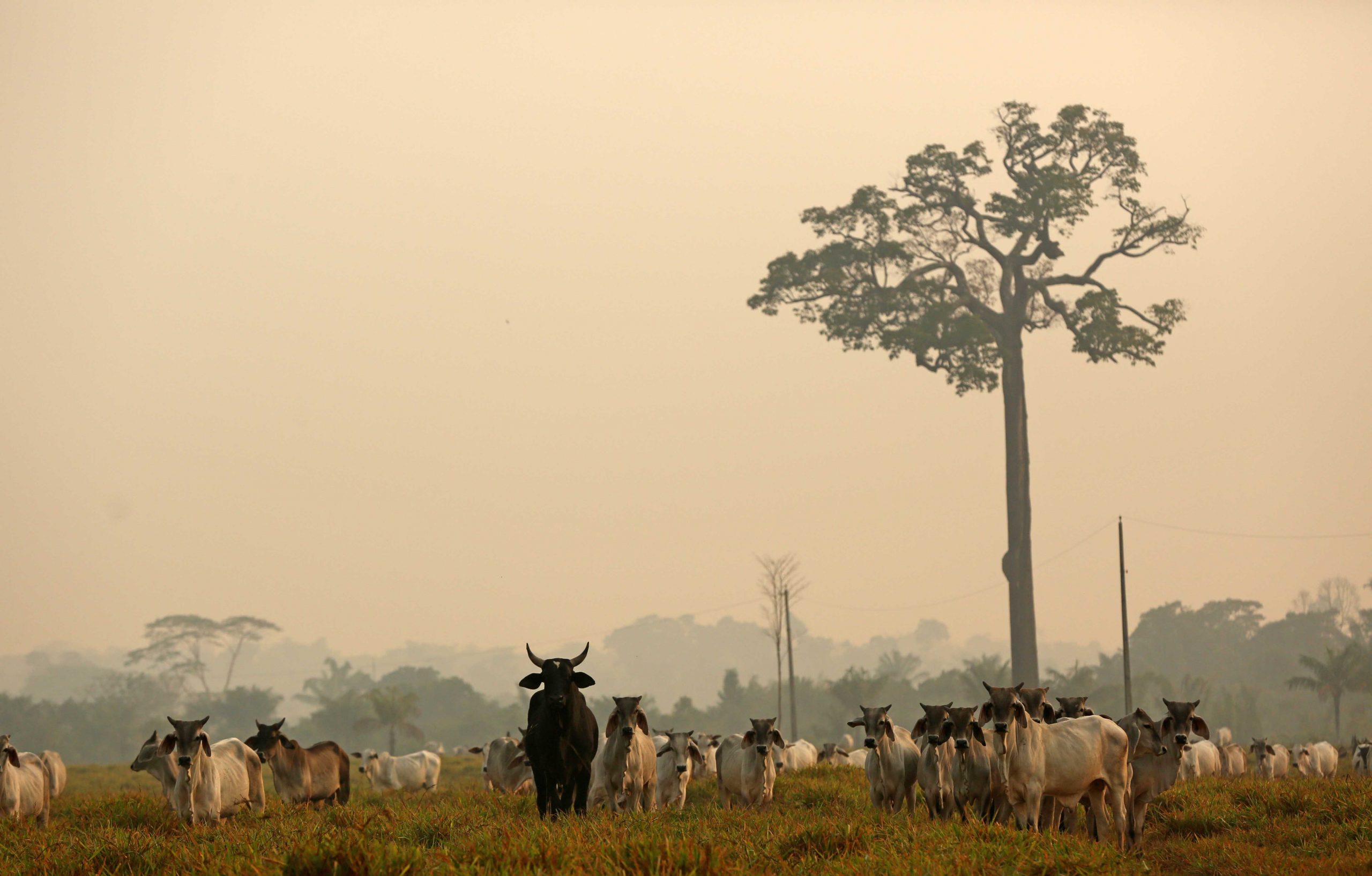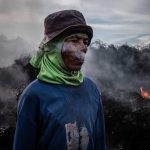Who will speak for the Amazon?
The Amazon is being devastated, deepening the global climate emergency. The world must save this life-giving rainforest and, in doing so, help to preserve life on Earth as well.
Author:
26 August 2019

Nero fiddled while Rome burnt; Jair Bolsonaro laughed his way through a stand-up comedy routine while swathes of the Amazon rainforest went up in flames.
Brazilian president Bolsonaro was in the country’s capital, Brasilia, at a performance by right-wing comic Jonathan Nemer. But millions of Brazilians were at the very same time watching Bolsonaro on national television as he told them that he would deploy the army to fight fires in the Amazon that were nothing to be alarmed about: It was a case merely of burning as usual. This despite the evidence that there have been more than 72 000 fires in Brazil this year, up by 84% on last year’s outbreaks. That it was a pre-recorded speech invites the thought that his caper at the comedy club was of more importance to Bolsonaro than talking live to Brazilians about a fire that threatens to engulf not only Brazil but the globe because of its grave environmental, geopolitical, economic and ideological consequences.
Reaction from world leaders has upped the ante in a situation that Bolsonaro thought was containable and which could be passed off as a Brazil-only affair. Germany’s Chancellor Angela Merkel and France’s President Emmanuel Macron placed the Amazon fires on the world agenda late last week, to Bolsonaro’s fury. Macron, resorting to US President Donald Trump’s preferred mode of communication, Twitter, tweeted: “Our house is burning”.
Macron was correct in pointing out the importance of the Amazon to the Earth and all its life forms. But it drew forth only ire from Bolsonaro, who accused the Europeans of “colonialism” and of dabbling in Brazil’s internal affairs. That the Amazon fires were the subject of emergency talks at the weekend’s G7 summit in the French luxury resort of Biarritz shows the seriousness of the situation. Macron said after the first day of the G7 on 25 August 2019 that the leaders of the group of countries – Canada, France, Germany, Italy, Japan, the United Kingdom and the United States – were nearing agreement on supplying “technical and financial help” to aid the fire-fighting efforts in the Amazon.
Related article:
Even before then, however, there were geopolitical and economic effects. Germany and Norway stopped giving money to the Brazilian government fund for the Amazon. France and Ireland threatened to block the recently agreed Mercosur (Southern Common Market) free-trade deal between the European Union and Argentina, Brazil, Paraguay and Uruguay unless Bolsonaro stopped Amazon deforestation. There was talk in several quarters of a boycott of Brazilian agricultural products, principally beef, because producing that contributes most directly to deforestation of the Amazon.
But linking trade to a commitment by Bolsonaro to act against the illegal chopping down of vast tracts of the Amazon is a double-edged chainsaw for European political leaders given that the EU is a massive consumer of Brazilian beef. Across the English Channel, in Brexit-bound Britain, the same appetite applies. Moreover, the United Kingdom’s Minister for Trade Conor Burns was cooped up in Brasilia last week in talks about British-Brazilian business after Brexit.
Destruction of life
Whatever the geopolitical, economic and ideological fallout turns out to be, none of those is as important or as tragic as the harm caused to the indigenous peoples, life forms and trees of the Amazon, and to the environment of the whole world. There are more than one million indigenous people in the Amazon. There are more than three million plant and animal species there, about 10% of all life on Earth. If the forest reaches an environmental tipping point from which it will be unable to recover, then the world stands to lose plant species found nowhere else – and 75% of the plants in the Amazon grow there and there only.
Species jeopardy aside, the cutting down and stripping out of the Amazon, together with the presence of millions of methane-emitting cattle, would severely diminish the rainforest’s ability to absorb carbon dioxide and so cool the Earth’s temperature. So, despite Bolsonaro’s rhetorical ploy that the Amazon fires are a purely internal Brazilian affair, he is wrong. The flames add greater urgency to the climate emergency that is the single biggest threat to a reasonable life on Earth for everyone and everything that lives here.
Related article:
Against the wellbeing of the entire globe is ranged a right-wing populist exploiting many of the poor, the jobless and the working-class people of Brazil. They believe Bolsonaro is something of a saviour, sending them out into the verdant Amazon to make their lives liveable and better – and perhaps even to make their fortunes.
Bolsonaro is the self-fashioned poster boy for formerly illegal loggers, farmers and miners. He has invited all those groups into the Amazon and to exploit it as a resource for the “Brazilian people”, regardless of the human and environmental impacts and effects. Not for nothing have they affectionately and admiringly dubbed him Captain Chainsaw.
Emboldened and authorised by Bolsonaro, the loggers have chopped down ancient forests, the farmers have burnt and cleared trees to make way for cattle and soya beans, and the miners have stripped the land of trees and burrowed into the deep, rich earth to render it hollowed out, dry and barren. That much of the world’s media has chosen to term the fires now raging in the Amazon as “wildfires” is regrettable because many of them are not. They have been deliberately started by human agency, for human profit.
Gospel of wealth
Part of the Brazilian president’s support comes from the very new charismatic evangelical Christian movement in the country. Some of its preaching celebrates wealth, as in North America where the so-called Prosperity Gospel has made huge inroads. The rise of the Brazil evangelicals in the last two decades has been so swift that the Roman Catholic Church no longer has an unchallenged call on the spiritual devotion of Brazilians. Not for nothing was Pope Francis’s first visit to South America to Brazil rather than to his homeland of Argentina.
And not for nothing did Francis write the encyclical letter Laudato Si’ (Praise be to you): On Care for Our Common Home and publish it in May 2015. He was already envisioning the environmental catastrophe to come, as is evident here:
“23. The climate is a common good, belonging to all and meant for all. At the global level, it is a complex system linked to many of the essential conditions for human life. A very solid scientific consensus indicates that we are presently witnessing a disturbing warming of the climatic system … Another determining factor has been an increase in changed uses of the soil, principally deforestation for agricultural purposes.”
Related article:
The pope aside, there is considerable opposition in Brazil to Bolsonaro’s environmental barbarism. This past weekend saw protests in the country’s three largest cities, São Paulo, Rio de Janeiro and Brasilia.
Opponents at home and abroad might do nothing to deter Bolsonaro from his environmental cleansing. But to say nothing and to do nothing invites comparison with the inaction condemned in the famous words of the Lutheran pastor Martin Niemöller:
First they came for the socialists, and I did not speak out – because I was not a socialist.
Then they came for the trade unionists, and I did not speak out – because I was not a trade unionist.
Then they came for the Jews, and I did not speak out – because I was not a Jew.
Then they came for me – and there was no one left to speak for me.
The indigenous peoples of North America, whom familiar usage compels us to call Native Americans, used to ask at their councils “Who will speak for Wolf?”
New Frame asks: “Who will speak for the Amazon?” And the answer must be: All of us.



